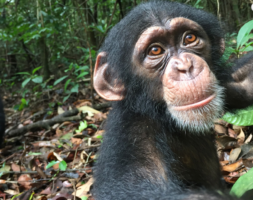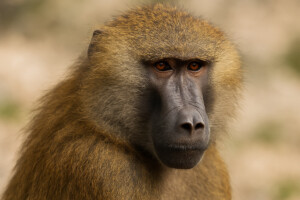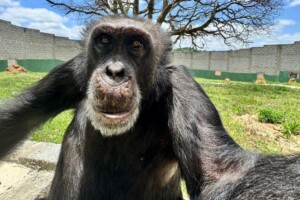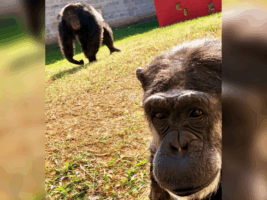Brazilian vets from GAP do internship in African Sanctuary

Three Brazilian veterinary doctors – two from GAP Sanctuary of Paraná and one from Sorocaba – were at the Chimfunshi Sanctuary, in Zambia, for an internship course of treatment of chimpanzees, especially for anesthesia.
Carolina, Camila and Milena
The course was conducted by specialized veterinarians in chimpanzees, from Africa, England and United States. During 16 days, 105 chimpanzees were anesthetized and clinic evaluation, including collecting samples of blood, faeces, etc, for further laboratory testing. The vets also compared the state of the heart of chimpanzees in captivity and in the wild and humans. There is a concern about premature heart diseases that affect chimpanzees in captivity.
Sheila Siddle and team
Chimfunshi Sanctuary is the oldest one in Africa. Zambia does not have chimpanzees in the wild , however, as it is on the border with the Democratic Republic of Congo, traffickers often cross the border to sell mostly babies, who are sometimes caught by the environmental authorities of Zambia and are brought to this sanctuary.
The sanctuary is supported by donations and the agricultural production of its farm, there are four areas where four groups of chimpanzees live (aerial photo above). These areas are surrounded by electric fence and have dorms, where many of them return in the late afternoon, are fed and stay overnight.
In the extensive report that Dr. Camila Gentile, veterinary of Sorocaba Sanctuary , prepared for us, she presents some very interesting information: the dental status of chimps is bad, both free-living and the ones in captivity. In the beginning it was thought that captive chimps had a bad teething because they had access to cane sugar and bottled juices which were eventually donated, but veterinarians who deal with free-living chimpanzees recognize that they also suffer from the same dental problems. Comparing with our chimpanzees in Sorocaba, who have access to food with sugar, the teething is in great condition. Possibly the general immune status of our chimpanzees is also much better than the Africans; they are more resistant to frequent infections that attack the Africans, who have little immune resistance.
This type of internship is very useful to understand the biology and characteristics of chimpanzees, comparing them with those who never left their original continent.
Dr. Pedro A. Ynterian
President , GAP Project International
Mais fotos:

 Español
Español
 Português
Português















